- Java has 4 different kinds
of variables
(See:
click here)
- Class variables
- Instance variables
- Local variables
- Parameter variables
We have just learned about the local variables
In this webpage, we will discuss the parameter variables
Specifically:
- Purpose of
parameter variables
- How to
identify (and define)
parameter variables
- The life time of
parameter variables
- The scope of parameter variables
- Parameter variables:
- A parameter variable is used to store information that is being passed from the location of the method call into the method that is called
Example:
public class Class1 { public static void method1() { double x; // x contains // some information .... Class2.method2( x ); // Pass (give) information // stored in x to method2 !!! .... } .... }public class Class2 { public static void method2( double paramVar ) { statements that operate on paramVar .... } .... }Effect: the statement Class2.method2( x ) pass (= copy) the information stored in x into the parameter variable paramVar

Explanation:
- Inside the method
method1,
we
call (invoke)
method2 with the statement:
Class2.method2( x ); - Method1 has some
information (stored in
the variable x
inside the method method1) that it
want to
pass (convey) to
method 2
- The mechanism used to accomplish this passing of information are parameter variables
- Terminology:
- The method that calls (invokes, runs)
another method is called the
caller or the
calling method
- In the above example, method1 is the caller
- The method that
is called
is called the
callee or the
called method
- In the above example, method2 is the callee
- The method that calls (invokes, runs)
another method is called the
caller or the
calling method
- A previously used example:

Explanation:
- Method main is
calling (invoke) the
method min
- main is the caller
- Method main has some
information
(the values 1.0 and
4.0) that it
want to
pass (convey) to
method min
- min is the callee
- The mechanism used to accomplish this passing of information uses the parameter variables a and b
- Method main is
calling (invoke) the
method min
- How to the define
(and recognize)
a parameter variable:
- A parameter variable is
defined inside the
brackets ( ... ) of
the header of a method
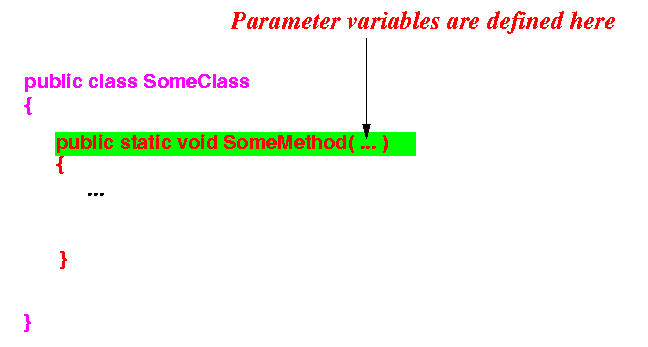
Example:
public class MyProgram { public static void main(String[] args) { // Body of method "main" double r; // *** Local variable r = MyProgram.min( 1.0, 4.0 ); System.out.println(r); r = MyProgram.min( 3.7, -2.9 ); System.out.println(r); r = MyProgram.min( -9.9, 3.8 ); System.out.println(r); } }
public class ToolBox { public static double min ( double a, double b ) { // Body of method "min" double m = 0; // *** Local variable if ( a < b ) { m = a; // a is the smaller value } else { m = b; // b is the smaller value } return(m); } }Comments:
- The variable args
in method main is
a parameter variable
Its type is String[] (will be explained much later...)
- The variables a and
b
in method min are
2 parameter variable
Their type is double (you should know what that means...)
- A parameter variable is
defined inside the
brackets ( ... ) of
the header of a method
- The life time of a
parameter variable:
- is the entire body of the method
Example:
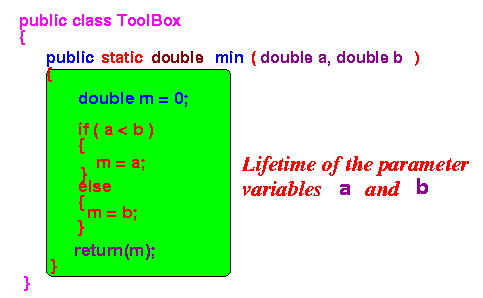
Therefore, parameter variables has the same life time as local variables that are defined at the start of the method.
In other words, you can look at parameter variable like this:
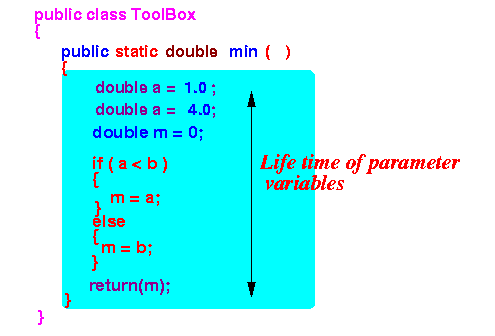
- The scope of a
parameter variable:
- is also the entire body of the method
Example:
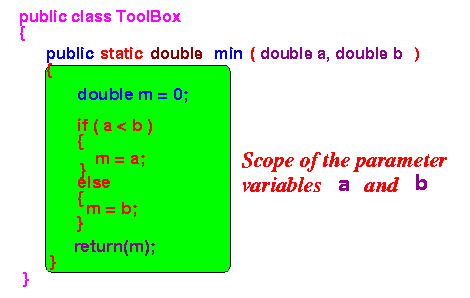
Just like the life time, parameter variables has the same scope as local variables that are defined at the start of the method.
In other words, you can look at parameter variable like this:
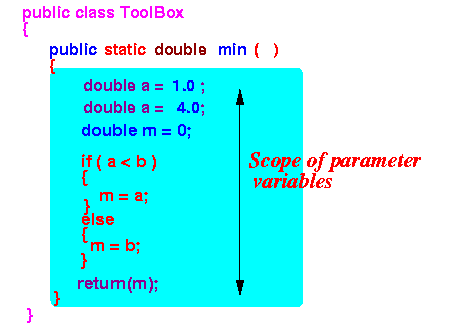
- Simple rule to go by:
- A parameter variable
behaves like a
local variable that
is defined at the
start of the method
- However,
unlike a local variable
(that cannot be accessed
by the calling method):
- The value of the parameter variable is always initialized by the calling method using the values inside the method call
- A parameter variable
behaves like a
local variable that
is defined at the
start of the method
- Example:
- The method call
ToolBox.min(1.0, 4.0):
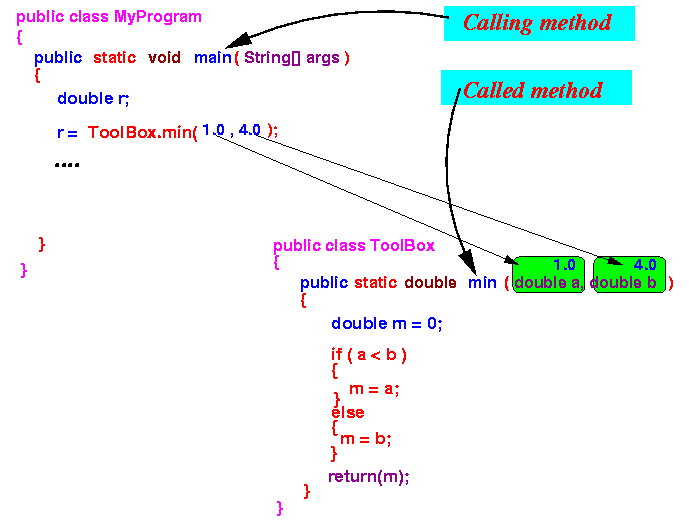
The parameter variables are initialized with the values in the method call:
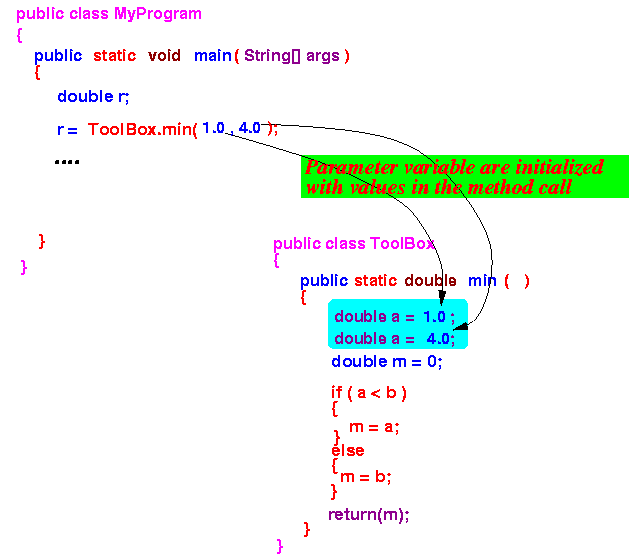
Now you can understand completely why the ToolBox.min method will return the value 1.0 !!!
(Because it used parameter variable with values 1.0 and 4.0 - so it will return the smaller value which is 1.0)
- The method call
ToolBox.min(1.0, 4.0):
- The following facts are
important to
determine whether a
name of a parameter variable
will
conflict with
names of local variables:
- The
scope of parameter variables is
the entire body of
the method
- You cannot define
different variables with
the same name inside
the same scope
- Rule in Java: You cannot define different variables with the same name inside an outer scope and inside an inner scope
- The
scope of parameter variables is
the entire body of
the method
- Conclusion:
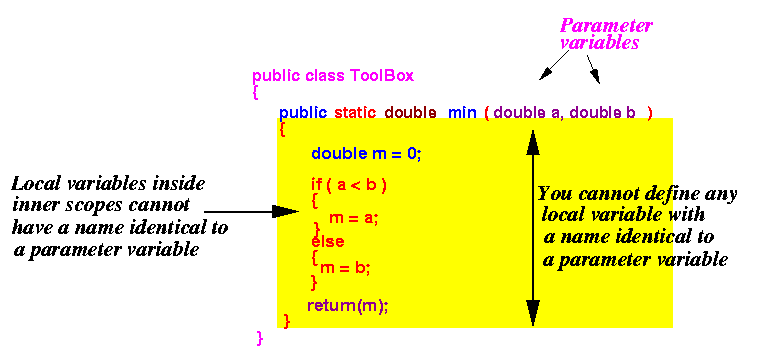
In other words:
- In Java, you cannot define a local variable inside a method that has the same name as a parameter variable.
- The following fact is
still true for
parameter
and local variables
that reside in
disjoint scopes:
- You can define different (parameter and/or local) variables with the same name in disjoint scopes
- Example:
public class MyProgram { public static double min ( double s, double r ) { double m = 0; if ( s < r ) { m = s; // s is the smaller value } else { m = r; // r is the smaller value } return(m); // Output of the method } public static void main(String[] args) { double r; r = min( 1.0, 4.0 ); System.out.println(r); r = min( 3.7, -2.9 ); System.out.println(r); r = min( -9.9, 3.8 ); System.out.println(r); } }Note:
- The parameter variable r in the min method and the local variable r in the main method are 2 different variables
- Example Program:
(Demo above code)

- Prog file: click here
How to run the program:
- Right click on link and
save in a scratch directory
- To compile: javac MyProgram.java
- To run: java MyProgram